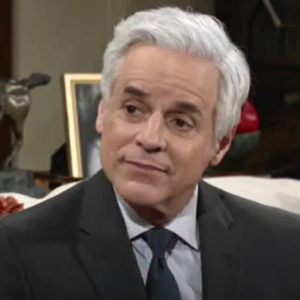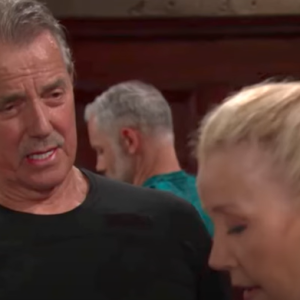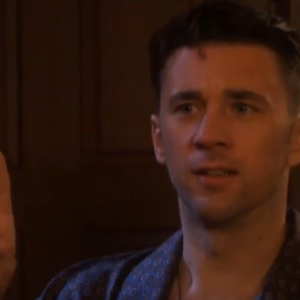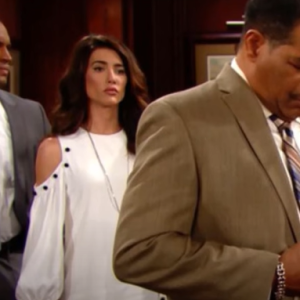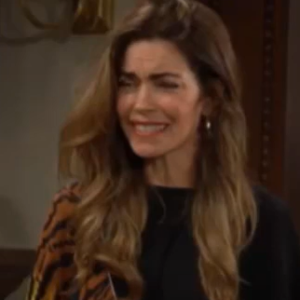In a bittersweet moment that stunned soap fans, Tristan Rogers delivered one final, haunting performance as Colin Atkinson on The Young and the Restless, marking the actor’s last appearance in a career defined by flawless doubles—dramatic turns that have left an indelible mark on audiences across generations. The revelation arrived like a tremor through the fandom: Rogers, beloved for decades as the roguish Colin, would return one last time, not in the blaze of triumph but in the quiet, tremulous glow of a deathbed memory. This episode, a flashback-laden farewell, stitched a delicate tapestry of legacy and loss, inviting viewers to confront the impermanence that colors every soap opera’s long arc.
Tristan Rogers had already carved out an enduring legend in daytime television long before he stepped onto the screen as Colin Atkinson. In the world of General Hospital, he had become synonymous with Robert Scorpio—an icon whose espionage savvy and dangerous charm cemented his status as a pillar of the ABC soap’s golden era. Yet the industry’s permeability and Rogers’s magnetic screen presence allowed him to inhabit another realm entirely: Genoa City, where Colin was a criminal mastermind who could charm a room and steal a fortune with the same sly wink. Over the years, Colin’s con games—centered around Devon Hamilton’s inheritance and an intricate web of deceit—coexisted with rarer, more intimate moments that humanized a man who wore his misdeeds with a rakish smile. The duality of Colin’s character—criminal acumen tempered by rare flashes of vulnerability—made him a standout figure in The Young and the Restless’ sprawling universe.
The episode in question arrived after a long, slow burn of anticipation. Rogers’s portrayal of Colin had evolved from a fresh-out-of-prison schemer to a patriarchal force whose shadow hung over Jill Abbott’s heart and Kane Ashby’s loyalties. The flashback mechanics were exquisitely chosen: rather than a conventional send-off, the show offered viewers a reflective, deathbed tableau that reframed Colin’s narrative through Kane’s faltering memory and love for his father. It was a choice heavy with significance. The scenes framed Colin’s final hours not as a triumphal exit but as a quiet, devastating acknowledgment of mortality—a testament to the maestro’s ability to coax tenderness from a character defined by crime and secrets. The performance carried an almost ceremonial weight, the kind of farewell that fans instinctively understand as a personal gift from actor to audience.
Within the flashbacks, Kane Ashby’s bedside vigil became the crucible in which Colin’s true legacy was tested. As Kane read the newspaper aloud, the tension between memory and present danger sharpened. Colin, frail and lucid, pressed his son to stay anchored to family and to resist the temptations of a life defined by numbers and schemes. The specious swagger that once framed Colin’s every move gave way to a raw, human plea: don’t lose who you are while you’re still standing. The dialogue crystallized into a final counsel on identity, a reminder that, beneath the crime and the con, the most enduring currency is love—an inheritance far more valuable than any fortune Colin accrued or any empire he built. It was, in essence, a tribute scene: a last opportunity for viewers to glimpse the fragility behind a formidable facade.
The emotional weight of the final scenes was intensified by the show’s careful choreography of memory and consequence. Colin’s admonition to Kane to “get rid of the Duma thing” and to tell Jill how much he loves her before it’s too late struck a resonant chord that echoed beyond the studio. Those lines, delivered with Rogers’s characteristic gravitas, framed Colin not merely as a villain but as a father who recognized the limits of time and the irrevocable impact of his choices. The final words—that Kane would break the news to Jill when the moment was right—left a lingering ache. They reminded the audience that the show’s most devastating truths are rooted in family dynamics: the complex, sometimes painful, but always intimate bond that persists even after characters pass through the fog of crime and rivalries. Colin’s last message was not a sermon on moral rectitude but a quiet, stubborn insistence on human connection.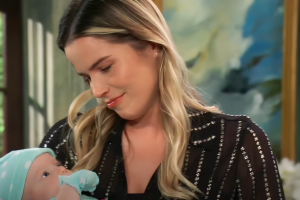
The meta-narrative surrounding Rogers’s death—his own terminal illness and the decision to film Colin’s deathbed sequence while he was living with his final days—added a layer of poignancy that fans could not ignore. The convergence of life and art lent an almost impossible authenticity to the performance. Watching Colin’s deathbed scenes unfold, viewers felt the tremor of reality bleeding into fiction, a rare moment in television where life imitates art with a gravity that transcends the usual soap opera cadence. The episode’s cultural resonance extended beyond the screen: it served as a compassionate remembrance of a beloved actor whose work had shaped the DNA of daytime television for decades. Collected in those moments were the many shades of Rogers’s craft—his ability to slip between charm and menace, to invest a line with sly humor, and to bring a quiet, almost reverent gravity to scenes of vulnerability.
For the fans, the collaboration between Tristan Rogers and Billy Flynn—newer in his role as Kane Ashby—represented a bridging of generations within the same familia of stories. Flynn’s portrayal of Kane’s evolving arc, now illuminated by the memory of his father’s influence, gained a new dimension as it intersected with Colin’s legacies. The moment—the two actors sharing screen time, Colin’s voice receding into memory as Kane confronted present-day truths—felt like a rite of passage for both characters and performers. It was a chance to honor the past while propelling the current storyline forward, a delicate balance that soap operas sustain through the years by leaning into such reverberant reunions.
In the broader scope of soap opera history, Tristan Rogers’s final appearance as Colin serves as a testament to the enduring power of well-crafted legacy storytelling. The character’s arc—rooted in deception, redemption, and a complicated paternal affection—exemplifies why audiences remain emotionally invested in long-running serials. The bittersweet nature of Colin’s send-off—frail, yet fiercely present in the memory of his son and the echo of his choices—resonates with fans who know that endings in this genre are rarely conclusive but are always meaningful. The industry, too, gains from such moments, as they underscore the value of veteran actors whose longevity anchors the narrative’s emotional stakes. Rogers’s performance, in its final iteration, stands as a luminous, profoundly human coda to a storied career.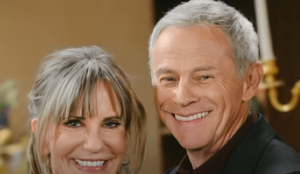
As the credits rolled on this particular chapter of The Young and the Restless, the collective reaction from viewers was one of gratitude and sadness in equal measure. Gratitude for a last glimpse of Colin Atkinson’s complex charisma and for the craftsmanship that brought him to life across multiple decades; sadness because the chapter has closed and the stage feels emptier without Rogers’s unmistakable presence. Yet within that sadness lies a celebration of legacies accomplished, of a string of scenes that captured the essence of what makes daytime drama resonate: pivotal relationships, moral ambiguities, and the quiet, stubborn insistence that family—despite its flaws and fractures—remains the most enduring, consequential plotline of all. Tristan Rogers’s final scenes as Colin Atkinson will be remembered not only as a farewell to a beloved rogue but as a tribute to a performer whose artistry could illuminate the darkest corners of a character’s soul and render the most mundane moment—a bedside reading, a whispered confession—into something that lingers long after the screen goes dark.
